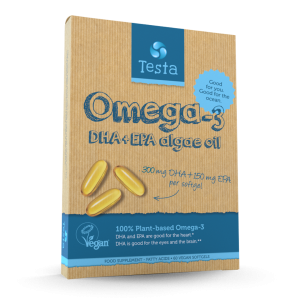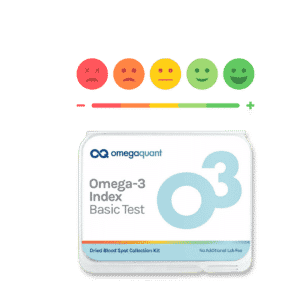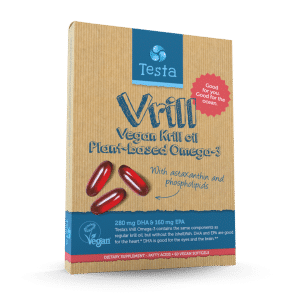Omega-3 for Women

- 100% plant-based from algae
- Good for heart, brain, & eyes
- Certified 'Plastic Negative'
- Gain insights into your omega-3 index
- Independent certified laboratory
- Including advice to increase levels
- 100% Plant-based krill oil alternative from algae
- Enhanced absorption due to phospholipids
- High in astaxanthin
DHA & EPA Omega-3 Algae Oil Capsules
Omega-3 Index Self-Test
Vegan Krill Oil DHA & EPA Omega-3
Our omega-3 requirements aren’t one-size-fits-all; they vary by age, gender, health, and other factors. For women, this puzzle becomes even more complex, especially during pregnancy and breastfeeding. Understanding your unique needs is crucial to maintaining optimal health throughout each life stage.
Once you’ve determined your omega-3 requirements, you’ll be on the right track to achieving adequate omega-3 levels and enjoying all the heart and brain benefits that will keep you feeling your best. But first, let’s dive into the basics.
Understanding Omega-3 Fatty Acids
Omega-3 fatty acids are a type of polyunsaturated fatty acid (considered a ‘healthy’ fat) and an essential component of our cell membranes, providing structure and maintaining their regular functions. This fatty acid comes in many forms, including DHA, EPA, and ALA. DHA is generally associated with brain and eye health, while EPA is linked to heart health. ALA, on the other hand, converts into both DHA and EPA in small amounts in the body.
Omega-3s are found mainly in seeds, nuts, algae, and fish.
While fish oil is the most popular source, fish do not produce omega-3s on their own. Given the popularity of this type of omega-3 supplement, those looking for omega-3 fish oil for women may be surprised to learn that fish obtain these fatty acids from algae, and we can, too.
Although most people do not have optimal levels of omega-3s in their blood, the benefits of achieving this are well worth the effort. Those with optimal omega-3 levels enjoy better heart, eye, joint, and brain health. Omega-3s also support immunity and help boost athletic performance.
What Amount of Omega-3s Do Women Need?
Women need at least 1.1g of ALA daily, while pregnant and lactating women even need 1.4g of ALA daily. This form of omega-3 converts into docosahexaenoic acid (DHA) and eicosapentaenoic acid (EPA) in the body. However, the amount converted is minimal. For this reason, experts recommend adults take 250mg of additional combined DHA and EPA daily, an amount you’ll surely find in the best omega-3 for women.
Why Women Need Omega-3 Supplements
Omega-3s are incredibly beneficial for women’s heart health, brain function, skin health, and reproductive health. Some studies also indicate that they are effective for mood regulation.
Since ALA fatty acids are not an adequate source of omega-3s, DHA and EPA supplements are necessary for women who don’t consume fish or fish oil. However, land-grown algae oil supplements can in general be considered the best omega-3 for women, on account of their guaranteed purity, superior freshness, and sustainability.


